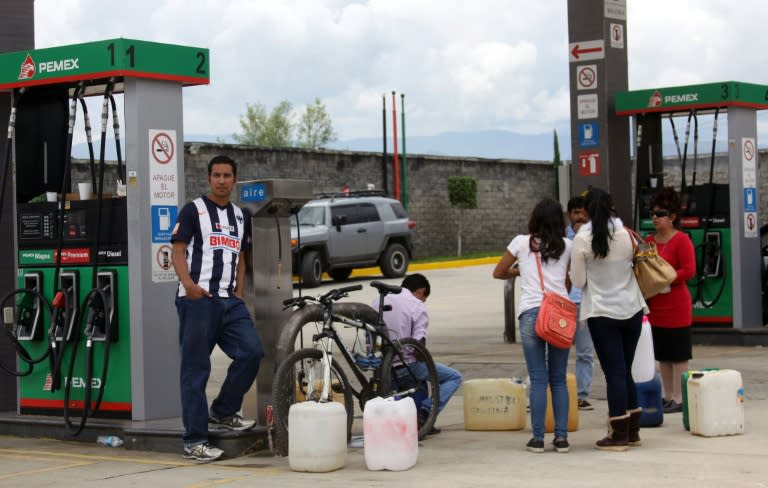Mexico imports gasoline as thefts cause shortages
Mexico is importing 75,000 extra barrels of gasoline per day in an "unprecedented" move to mitigate shortages in several states caused by illegal pipeline taps, authorities said. An official at the state-run energy firm Pemex said the "extraordinary measures" were needed to supply service stations in several cities. "We have increased our imports of products to almost 75,000 barrels, an unprecedented figure," Francisco Fuentes Saldana, Pemex's stock and distribution deputy director, told the Televisa network. A Pemex spokesman told AFP that the imports from the United States, which began last week, are on top of 400,000 barrels of gasoline that Mexico normally receives from around the world. The special import will likely be cut by half by Wednesday as production at refineries increases, the spokesman said, adding that the temporary measure should end by next week. Fuentes blamed the shortage on "an exponential increase of illegal taps in recent years." Drug cartels have been stealing gasoline from pipelines as they diversify their business. Illegal taps have increased from 1,620 in 2012 to 4,218 in 2014, Fuentes said. This year, authorities have already found 2,813 illegal taps. Shortages at service stations have been reported in a half-dozen states, including Aguascalientes, Chihuahua, Coahuila, Jalisco, Nuevo Leon and Zacatecas. Long lines of cars formed at service stations last week in Guadalajara, Mexico's second biggest city, but fewer were seen over the weekend as the problem appeared to wane. Fuentes said service would return to normal in Guadalajara and Aguascalientes on Tuesday. Monterrey, a major industrial hub in the north, will see normal service by next Monday. - Stopgap solution - Pemex announced in February that it would stop shipping ready-to-use gasoline and diesel through land pipelines across the country after more than $1 billion worth of fuel was stolen last year. The company had said that it would instead only use the pipelines to transport unfinished gasoline that would go through the last mixing process at storage plants. "This does not resolve the problem, it's a stopgap" solution, said Alejandro Villagomez, an energy expert at the Center for Economic Research and Teaching (CIDE) think tank. "If you don't transport through pipelines, you have to use trucks and that is much more expensive," Villagomez told AFP. Illegal taps have cause environmental disasters and even deaths. In April, some 100,000 people were left without drinking water in the southern state of Tabasco after oil spilled into rivers. In December 2010, an illegal tap caused a deadly explosion that killed 29 people in the central town of San Martin Texmelucan. The surge in thefts comes as Mexico opens its energy sector to foreign investors for the first time since 1938 under a historic reform championed by President Enrique Pena Nieto. The first auction for oil drilling will take place on July 15, with shallow-water projects in the Gulf of Mexico up for bid. Villagomez said the thefts will not affect the auction because the projects involve offshore exploration and drilling projects. "It has an impact on the finances of Pemex and, given that Pemex is a public company, it has an impact on the country's public finances," he said.



